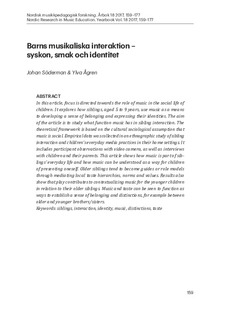Barns musikaliska interaktion – syskon, smak och identitet
Chapter, Peer reviewed
Permanent lenke
http://hdl.handle.net/11250/2490524Utgivelsesdato
2018Metadata
Vis full innførselSamlinger
- Artikler og bokkapitler [390]
Originalversjon
I: Nordic Research in Music Education. Yearbook Vol. 18 2017, s. 159-177Sammendrag
ABSTRACT -
In this article, focus is directed towards the role of music in the social life of children. It explores how siblings, aged 5 to 9 years, use music as a means to developing a sense of belonging and expressing their identities. The aim of the article is to study what function music has in sibling interaction. The theoretical framework is based on the cultural sociological assumption that music is social. Empirical data was collected in an ethnographic study of sibling interaction and children’s everyday media practices in their home settings. It includes participant observations with video camera, as well as interviews with children and their parents. This article shows how music is part of siblings’ everyday life and how music can be understood as a way for children of presenting oneself. Older siblings tend to become guides or role models through mediating local taste hierarchies, norms and values. Results also show that play contributes to contextualizing music for the younger children in relation to their older siblings. Music and taste can be seen to function as ways to establish a sense of belonging and distinctions, for example between older and younger brothers/sisters.
Keywords: siblings, interaction, identity, music, distinctions, taste
Utgiver
Norges musikkhøgskoleSerie
NMH-publikasjoner;2017:8Nordisk musikkpedagogisk forskning;Årbok 18
